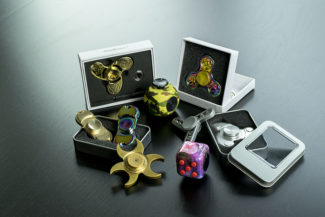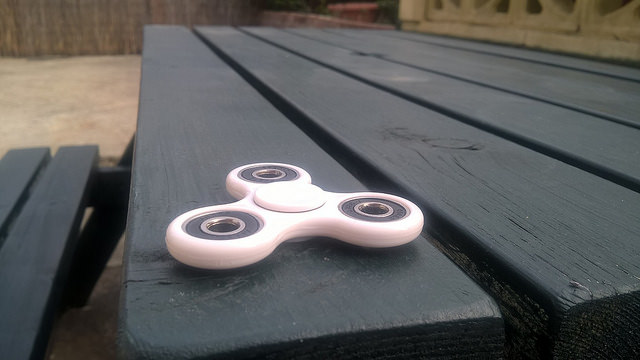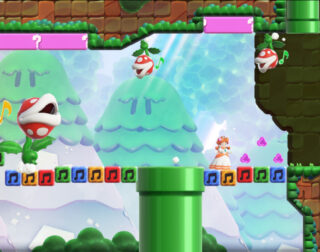In recent months, many of the parents who have previously expressed concern about screen time have a new worry — their children’s obsession with fidget spinners. I first became aware of the prevalence of fidget spinners in April 2017, when virtually every preteen kid coming to my office had one in hand. I started to do my own research, taking a closer look at the toys to determine if fidget spinners really work to help kids focus and concentrate. I bought a fidget spinner and a fidget cube and began interviewing my patients and their parents about their experiences with fidget spinners.
I Went to the Experts: Kids
So far I’ve conducted nearly 20 interviews with kids ranging in age from 5 to 16, often getting commentary from their parents as well. Interestingly, the consensus among these children and parents is that fidget spinners are not effective tools for helping people focus. Before we discount the value of fidget spinners completely, however, it’s important to recognize that there are many types of attention. Focus manifests differently in visual, auditory, kinesthetic, sensory, and social/emotional environments. In other words, the focus required to listen to a lecture might be very different from the attention needed to tune into the emotions of others or to complete a writing assignment. Fidget spinners by their very nature require observation and hamper visual attention. They may also interfere with the capacity to attend to writing and kinesthetic activities particularly taking notes and learning through modeling or observation.
There’s no getting around the fact that fidget spinners require visual attention. Many of my patients volunteered this fact and acknowledged that looking at a fidget spinner means they aren’t looking at the teacher who’s talking, or at school work, or a computer screen. Kids report (and I can concur through my own experiences) that you want to look at the spinner because that’s what makes it engaging, and you need two hands until you get really good at doing a one hand spin — making writing or typing virtually impossible. So in taking a closer look at these fidget spinners I’ve come to view them as a tool that might take away from specific types of attention, most notably visual and kinesthetic attention.
What the Experts Say
Here are some of specific comments my child interviewees have made that have helped me draw my conclusions about whether fidget spinners really work:
Christine, a 14-year-old ninth grade student, reported that she got her fidget spinner because she gets bored. She does not see it helping with focus, noting that it’s “more of a distraction. People spin a lot and don’t pay attention, it makes noise, and it’s annoying.” She stated that she doesn’t see fidget spinners “helping focus in any way.”
Sophie, an 11-year-old fifth-grade student, reported that her fidget spinner “takes my mind off the stress, and it puts me into a trance.” When asked whether it helps her focus in school she noted, “Not really, because it takes my mind off of school. It distracts you when you look at it, and you know how they say look at the speaker. So if you are not directly looking at the teacher, it’s hard to pay attention.”
Hannah, a 10-year-old fourth grader, told me that fidget spinners are “fun because you can spin it on your thumb, and it glows in the dark.” She said her fidget spinner “helps me to relax because when it spins it’s calm and makes the noise.” She described how her fidget spinner “makes homework easy because I can spin it, and then write down the stuff. I look at it and do my homework, and it makes it more funner to do it, so it goes faster.” When I asked whether it helps kids focus Hannah stated, “Some people it’s probably not helpful because they’re fooling around with it. The others might focus on it, and then they are looking at the teacher.”
Two of the children I interviewed wanted fidget spinners but did not have them because their teachers didn’t approve. Thomas (age 6) was a bit confounded over the popularity of the fidget spinner, noting, “I don’t know why other kids like them.” Jack, age 8, reported that they are “really awesome and cool and you can spin them,” but when asked if fidget spinners help kids to focus, he vehemently argued, “NO! It doesn’t help them to pay attention. Sometimes they get into trouble. They are just looking at the fidget spinner instead of looking at the teacher.”
I’m a Fidgeter

Fidget toys come in all shapes and sizes. | Photo credit: www.fidgetcircle.com
My personal experience with a fidget spinner and a fidget cube has also given me some insights. I routinely use some type of movement and sensory experiences to enhance my own concentration and attention. For example, I am listening to classical music in the background as I type this sentence. I often walk around my house or do circles in my office while I am dictating reports or blog posts. I will sometimes play with a rock or a pen when I am involved in a creative task or problem solving. I found that the fidget spinner took away from visual attention to other tasks; I could not read, write, dictate or type effectively while playing with my fidget spinner. With my fidget cube, however, I could do everything with the exception of writing and typing because I did not need to look at it to enjoy the tactile experience. I have found similar experiences to be true with other objects, such as small gemstones, or even having a cup of tea to drink.
Inward vs Outward
The need to look at the fidget spinner takes away from visual, sensory, and kinesthetic attention but I find myself wondering whether it might not have some meditative qualities. Perhaps, if I were attempting to generate a list of ideas, engaged in a creative task, or simply being mindful, the fidget spinner would be useful. That would be consistent with some of the comments from my patients who describe stress reduction as a benefit of fidget spinner play. I feel as though fidget spinners might also be helpful in sustaining attention to an ongoing conversation.
What do you think of fidget spinners? Do you think fidget spinners really work to help kids focus? Or are they more of a toy? Have you or your kids had different experiences with fidget spinners? Please share them with us by commenting below or come talk to us on Facebook.
Featured image: Flickr user Shalu Sharma






Hello Dr. Kulman
First and foremost, I too am listening to classical music in the background as I type this sentence. I have read many positive things about the effects of listening to classical music. Now if I can only get that as an accommodation on the IEP’s I write, life would be grand. Maybe you can publish an article and make that suggestion?
Moving forward-
Your article sparked my attention as I am a mother of four boys and a teacher who doesn’t ban fidget spinners. Honestly, I think they will come and they will go. Such as many things do.
In case you haven’t been made aware of, some schools are banning fidget spinners because they are taking attention away from the areas you mentioned in your article.
I’ve heard students tell me that they use their spinner because they have ADHD-More like they woke-up one morning and they decided to slap a label on their self. Those conversations are short and comical.
I’ve seen students with many colors and styles. I’ve seen them being placed on their noses too.
In closing, this past weekend I was at a pool party watching my four and five-year-old have a blast while I was in the midst of a mild anxiety attack. So, I decided to take out of my pocket my five-year-old’s fidget spinner with the intent of calming down. I spun it..watched it..then put it away. My anxiety level had not been reduced.
As the months of summer pass by, I’ll be anxious to see what August will bring in the hands of the elementary kids I teach-if anything, a pencil will do.
Angela